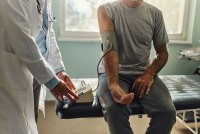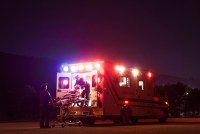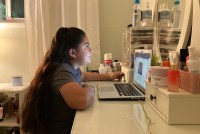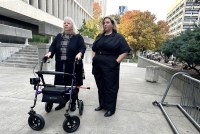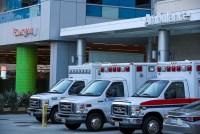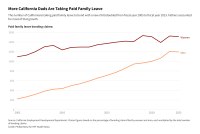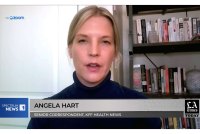Latest Morning Briefing Stories
Se avecinan cambios para Medi-Cal en 2024, pero ¿beneficiarán a los pacientes?
A partir del próximo año, más de 700,000 inmigrantes sin papeles serán elegibles para una cobertura completa de Medi-Cal.
New Doula Benefit ‘Life-Changing’ for California Mom
Doulas, independent workers who act as advocates for birthing parents, have been shown to help prevent pregnancy complications and improve the health of both mothers and babies. California’s Medicaid program started covering their services this year, but some doulas say bureaucratic obstacles and inadequate pay prevent their effective use.
In New Year, All Immigrants in California May Qualify for Medicaid Regardless of Legal Status
In the new year, California’s Medicaid program will open to otherwise eligible immigrants ages 26 to 49 without legal residency. They will join children, young adults, and adults over 50 enrolled in Medi-Cal through previous expansions to residents lacking authorization. The change is expected to add over 700,000 first-time enrollees.
Los nuevos inscritos se sumarán a más de 655,000 niños, adultos jóvenes de hasta 25 años y adultos de 50 años y más que ya se han registrado en Medi-Cal a través de expansiones anteriores para residentes sin papeles.
As Foundation for ‘Excited Delirium’ Diagnosis Cracks, Fallout Spreads
Major policy changes and disavowals have made this a watershed year for curbing the use of the discredited “excited delirium” diagnosis to explain deaths in police custody. Now the ripple effects are spreading across the country into court cases, state legislation, and police training classes.
Gun Violence Is a Plague. Could Medicaid Help?
To tackle America’s gun problem, a growing number of states are allowing Medicaid dollars to fund community-based violence programs intended to stop shootings. The idea is to boost resources for violence prevention programs, which have been overwhelmed in some cities by a spike in violent crime since the covid-19 pandemic. An infusion of reliable funding, […]
El condado de Los Angeles ofrece terapia virtual gratuita de salud mental para estudiantes
La teleterapia desempeña un papel cada vez más importante en las escuelas del país, a medida que educadores y trabajadores sociales se enfrentan a la presión de abordar los crecientes problemas de salud mental.
LA County Invests Big in Free Virtual Mental Health Therapy for K-12 Students
California is spending almost $5 billion to address a growing youth mental health crisis. In Los Angeles County, a contract with teletherapy provider Hazel Health is funding free therapy sessions for all interested students. School districts are grateful for the additional support, but express concerns about the remote arrangement.
California’s Ambitious Medicaid Experiment Gets Tripped Up in Implementation
The health care insurers, nonprofit organizations, and other groups responsible for implementing Gov. Gavin Newsom’s ambitious plan to infuse Medicaid with social services say their ability to serve vulnerable, low-income Californians is hamstrung.
Explosive DeSantis-Newsom Debate Reflects Nation’s Culture Wars
The two governors exchanged heated verbal barbs when they faced off in a wide-ranging debate that covered various health-related topics, from abortion to gun violence.
Back Pain? Bum Knee? Be Prepared to Wait for a Physical Therapist
Physical therapists left the field en masse during the covid-19 pandemic, even as demand from aging baby boomers skyrocketed. While universities try to boost their training programs to increase the number of graduates, patients seeking relief from often debilitating pain are left to wait.
‘Everybody in This Community Has a Gun’: How Oakland Lost Its Grip on Gun Violence
A few years ago, Oakland won national acclaim for slashing gun-related crimes. Then the covid-19 pandemic tore through poor neighborhoods, and the murder of George Floyd fueled distrust in police. With guns readily available, violent crime has once again skyrocketed, leaving the community struggling to contain it.
Health Care Is Front and Center as DeSantis and Newsom Go Mano a Mano
Florida’s Republican Gov. Ron DeSantis and California’s Democratic Gov. Gavin Newsom will square off in a first-of-its-kind debate on Nov. 30. KFF Health News compared the political rivals’ health care positions, showing how their policies have helped — or hindered — the health of their states’ residents.
La atención de salud, en el centro del debate entre DeSantis y Newsom
El candidato presidencial republicano Ron DeSantis y el gobernador demócrata Gavin Newsom —rivales políticos y representantes de la América roja y azul— se enfrentarán en un debate sin precedentes el 30 de noviembre en Georgia.
Beyond Insulin: Medi-Cal Expands Patient Access to Diabetes Supplies
California’s Medicaid program is making it easier for people with diabetes to obtain the supplies and equipment they need to manage their blood sugar, partly by relaxing preauthorization requirements that can cause life-threatening delays.
The Unusual Way a Catholic Health System Is Wielding an Abortion Protest Law
Dignity Health is suing several patients and their advocates for “commercial blockade” for refusing discharge during the covid-19 pandemic. The lawsuits could set precedents for use of the California commercial blockade statute, conceived to constrain abortion protesters, and how hospitals handle discharges.
New California Law Offers Fresh Protection From Steep Ambulance Bills
The law, which takes effect Jan. 1, prohibits out-of-network ground ambulance operators from billing patients more than they would pay for in-network rides. It also caps how much the uninsured must pay.
Dads Drive Growth in California’s Paid Family Leave Program
The number of men in the state taking paid family leave to bond with a new child has risen nearly 20% since the start of the pandemic.
Watch: California and Feds Invest in Health Care for Homeless People
KFF Health News senior correspondent Angela Hart discusses big developments in street medicine, both statewide and nationally.
California Expands Paid Sick Days and Boosts Health Worker Wages
Gov. Gavin Newsom signed legislation expanding paid sick leave to five days, extending bereavement leave to miscarriages and failed adoptions, and approving an eventual $25-an-hour health care minimum wage. Still, in a possible sign of national ambitions, the Democrat vetoed free condoms in schools and refused to decriminalize psychedelic mushrooms.



